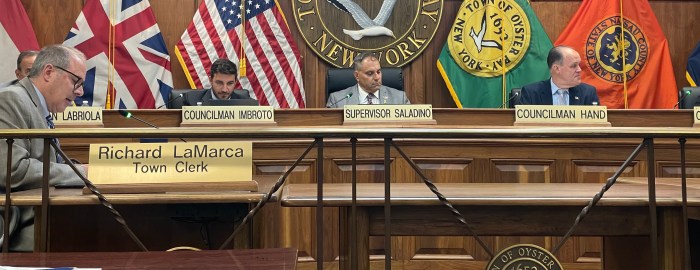Despite narrowly passing a 2.5 percent home energy tax earlier this year, the Nassau County legislature last week voted 13-5 in favor of repealing it. During a meeting Dec. 21, the 19-member legislature voted 13-5 in favor of the eliminating the tax; Republican Nassau County Executive-elect Edward Mangano, who currently represents the 17th District, was not present for the meeting and therefore did not vote.
The home energy tax, approved by the legislature in February and implemented in June, was imposed on all residential home energy sources – including LIPA electric usage, oil, natural gas, steam services and even coal, propane and firewood. [The energy tax was to fill a $38 million hole in the 2010 budget. At the time the tax was believed to have been “equitable” in that it affected homeowners and renters alike through their gas/electric bills. The funds were desperately needed considering the worldwide/nationwide economy and the tremendous loss of revenue in sales tax: no money, no shopping, no sales tax collection. ]
Republican legislators were opposed to the tax when initially proposed but earlier this year the 10-member Democratic majority approved it. As a result, Republicans, specifically Mangano, promised elimination of the tax once in office and, as of Jan. 1, the GOP will have an 11-8 majority.
At last week’s meeting, five of the county’s 10 Democrats – Jeff Toback (D-Oceanside) and David Mejias (D-Farmingdale), who both lost their re-election bids this November, along with re-elected legislators Joseph Scannell, Wayne Wink and Dave Denenberg – joined with Republicans and voted in favor of repealing the tax; Democratic party mates Judy Jacobs (16th L.D.), Judi Bosworth (10th L.D.), Kevan Abrahams (1st L.D.), Roger Corbin (2nd L.D.) and Diane Yatauro (18th L.D.), the current presiding officer, however, stuck to their guns and voted against the repeal.
“Repealing the energy tax was a Republican initiative and a cornerstone of my campaign,” said Mangano. “I intend to stand by the promise to repeal the energy tax and look forward to doing so responsibly. My financial team will address this through a collective and thoughtful process.”
It is believed that some $18 million was generated between June and December and it was anticipated that the energy tax would have generated nearly $40 million in 2010 alone. This much-needed revenue is, according to proponents, why the energy tax remains as necessary today as it was when it was initially proposed.
While Presiding Officer Yatauro could not be reached for comment at press time, Legislator Bosworth told Anton Community Newspapers that “the energy tax represented one of the options County Executive [Tom] Suozzi proposed to address the current fiscal crisis … This was an emergency measure that was enacted only in response to the decline in county revenue caused by the recent worldwide financial decline.”
The legislator added that the energy tax was the responsible thing to do some months ago as was voting against repealing it. “It was a necessary and painful step to take … [but] there has not been enough of a change in the economy to say it is no longer necessary which is why I [voted] against repealing the tax,” said Democratic Legislator Bosworth. “This measure was one that made our fiscal outlook better in a very challenging fiscal time.”
Republican Legislator Gonsalves, however, assures taxpayers that there are means in which to fill the budget gap without affecting their quality of life. “Nassau must return to the place where we can afford to raise our families and enjoy the quality of life our residents deserve,” she said.
Repeating History
The timing of the vote has an historical precedent since when then-County Executive Thomas Gulotta lost the election to Thomas Suozzi, the legislature was considering a transfer tax on home sales. Legislator Judy Jacobs (D) recalled that at that time, the Republicans called an emergency meeting before Thanksgiving abolishing the transfer tax and leaving a $60 million gap in the budget.
This year, in this legislature, Ms. Jacobs said, “I didn’t vote for it because my feeling was – I don’t vote without a solution. We did it [passed the energy tax] to help the county survive. Now that we lost the majority I have no idea on how they will fill that loss of funding. The county budget is shaky now.”
When Mr. Suozzi came into office he had to solve the financial gap in the budget and now Mr. Mangano faces the same challenge.
Ms. Jacobs said, “It was with great reluctance that I voted to impose the energy tax of 2 and a 1/2 percent at budget time. As a widow, I am fully aware of the serious financial burdens which are weighing heavily on all residents. However, the energy tax was needed to help us to continue to deliver services to residents to protect their health, safety and welfare and care for those who need us in the senior community, the youth community and those in need of social services. Nothing has changed as far as the dire financial circumstances we, along with the rest of the nation are experiencing right now. I, therefore, voted not to repeal the tax at this time until we know for sure how we can survive the loss of the $39 million dollars it brings into the County budget.
“I believe the vote was premature and will be frowned upon by Wall Street and affect our credit ratings.
“I would have been one of the first on line for repeal if someone showed me the alternatives being suggested to replace the loss of revenue.
“They didn’t so I continue to be fiscally responsible,” said Legislator Judy Jacobs.
“I believe the residents of my district have respected my honesty with them through the years. Serious times require difficult and serious decisions and this was one of the most difficult decisions which had to be made for the betterment of the county, as a whole,” concluded Ms. Jacobs who has been with the legislature for 14 years, during which time the legislators have received no raises.
Assemblyman Rob Walker, whose district includes East Norwich, Muttontown was unavailable for comment. He is involved with the process of moving to the county as the newly appointed NC Chief Deputy County Executive, (effective on Jan. 2) a position that was held by Marilyn Gottlieb under the Suozzi administration.
FYI: Mr. Walker’s mother, Rose Marie Walker, won her bid for Ed Mangano’s seat in the Legislature and left her seat on the Oyster Bay Town Board. No replacement for her job has been announced by the town at the present time. As of Jan. 1, 2010, the council member’s salaries will increase from $52,500 to $57,500. Ms. Walker has lost some income with her choice to serve the county which pays legislators $39,000.
Ed. Note: details were added to this story by Dagmar Fors Karppi.
































